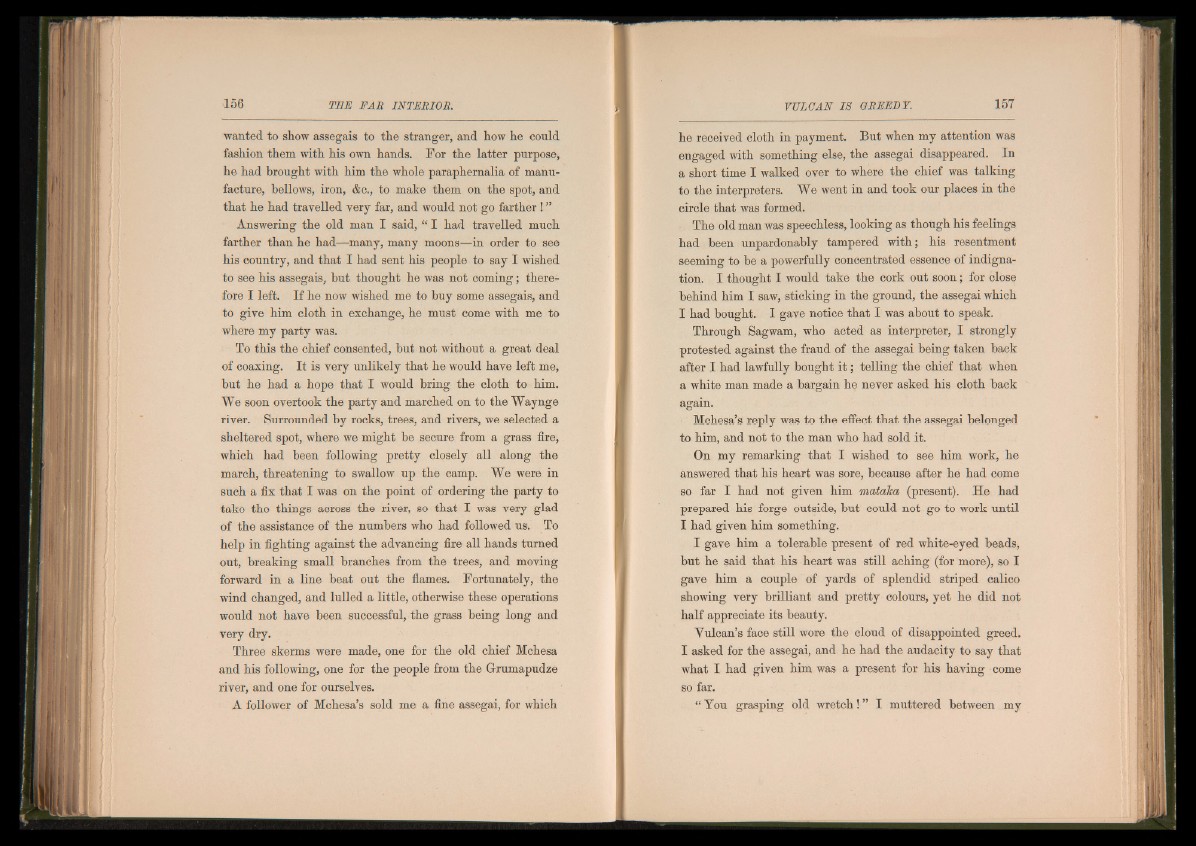
wanted to show assegais to the stranger, and how he could
fashion them with his own hands. For the latter purpose,
he had brought with him the whole paraphernalia of manufacture,
bellows, iron, &c., to make them on the spot, and
that he had travelled very far, and would not go farther ! ”
Answering the old man I said, “ I had travelled much
farther than he had—many, many moons—in order to see
his country, and that I had sent his people to say I wished
to see his assegais, but thought he was not coming; therefore
I left. If he now wished me to buy some assegais, and
to give him cloth in exchange, he must come with me to
where my party was.
To this the chief consented, but not without a great deal
of coaxing. It is very unlikely that he would have left me,
but he had a hope that I would bring the cloth to him.
We soon overtook the party and marched on to the Waynge
river. Surrounded by rocks, trees, and rivers, we selected a
sheltered spot, where we might be secure from a grass fire,
which had been following pretty closely all along the
march, threatening to swallow up the camp. We were in
such a fix that I was on the point of ordering the party to
take the things across the river, so that I was very glad
of the assistance of the numbers who had followed us. To
help in fighting against the advancing fire all hands turned
out, breaking small branches from the trees, and moving
forward in a line beat out the flames. Fortunately, the
wind changed, and lulled a little, otherwise these operations
would not have been successful, the grass being long and
very dry.
Three skerms were made, one for the old chief Mchesa
and his following, one for the people from the Grumapudze
river, and one for ourselves.
A follower of Mchesa’s sold me a fine assegai, for which
he received cloth in payment. But when my attention was
engaged with something else, the assegai disappeared. In
a short time I walked over to where the chief was talking
to the interpreters. We went in and took our places in the
circle that was formed.
The old man was speechless, looking as though his feelings
had been unpardonably tampered with; his resentment
seeming to be a powerfully concentrated essence of indignation.
I thought I would take the cork out soon; for close
behind him I saw, sticking in the ground, the assegai which
I had bought. I gave notice that I was about to speak.
Through Sagwam, who acted as interpreter, I strongly
protested against the fraud of the assegai being taken back
after I had lawfully bought i t ; telling the chief that when
a white man made a bargain he never asked his cloth back
again.
Mchesa’s reply was to the eifect that the assegai belonged
to him, and not to the man who had sold it.
On my remarking that I wished to see him work, he
answered that his heart was sore, because after he had come
so far I had not given him mataka (present). He had
prepared his forge outside, but could not go to work until
I had given him something.
I gave him a tolerable present of red white-eyed beads,
but he said that his heart was still aching (for more), so I
gave him a couple of yards of splendid striped calico
showing very brilliant and pretty colours, yet he did not
half appreciate its beauty.
Vulcan’s face still wore the cloud of disappointed greed.
I asked for the assegai, and he had the audacity to say that
what I had given him was a present for his having come
so far.
“ You grasping old wretch!” I muttered between my